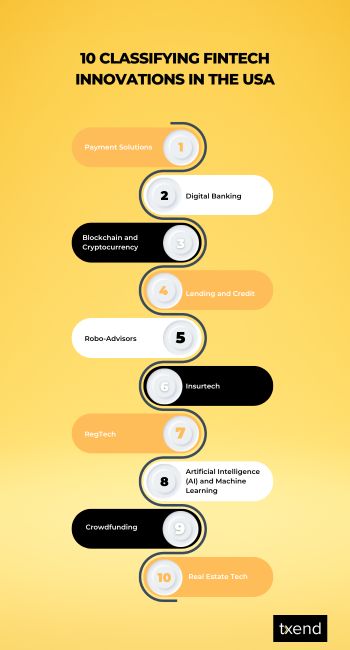In today’s rapidly evolving financial landscape, the question of “How valuable is fintech innovation?” resonates profoundly. Fintech innovations, often at the intersection of finance and technology, reshape how we manage, invest, and transact money.
As the global fintech revolution gains momentum, it’s imperative to delve into the intricacies of these innovations, particularly within the context of the United States.
This comprehensive review embarks on a journey to explore the multifaceted world of fintech innovation, providing an in-depth analysis of its value, significance, and impact on the financial industry in the USA.

We’ll navigate through the diverse spectrum of fintech innovations, examining how they are revolutionizing traditional financial services, and delving into their potential to redefine the future.
From groundbreaking payment solutions to cutting-edge blockchain applications, fintech innovations are transforming the way individuals and businesses engage with their finances.
We’ll scrutinize real-world case studies, conduct an innovation refunds review, and critically assess the disruptive potential of fintech innovation in the USA.
How Much Fintech Innovation Is Valuable?
Join us as we unravel the tapestry of fintech innovation, dissect its components, and evaluate its value proposition in the dynamic landscape of American finance.
Whether you’re a fintech enthusiast, an industry professional, or simply curious about the forces shaping our financial future, this exploration will provide you with valuable insights into the pivotal question: How valuable is fintech innovation?
Key Takeaways
- FinTech innovations in the USA encompass payments, lending, blockchain, robo-advisors, and insuretech, transforming financial services.
- Examples include PayPal (payments), SoFi (lending), Coinbase (blockchain), Betterment (robo-advisors), and Lemonade (insuretech).
- FinTech innovation in the USA drives convenience, financial inclusion, and efficiency, reshaping the financial landscape.
- Disruption from FinTech challenges traditional finance, sparking competition, innovation, and regulatory adaptation in the dynamic USA market.
10 Classifying FinTech innovations in the USA
Classifying FinTech innovations in the USA involves categorizing them based on their primary functions and impact within the financial industry.

Here are some key categories of FinTech innovations:
Payment Solutions:
- Mobile Wallets: Apps like Apple Pay and Google Wallet facilitate secure mobile payments.
- Peer-to-Peer (P2P) Payment Platforms: Venmo, PayPal, and Cash App allow individuals to transfer money easily.
- Contactless Payments: NFC technology enables quick, contactless smartphone or card transactions.
Digital Banking:
- Online-Only Banks: Institutions like Chime and Ally Bank offer branchless, digital banking services.
- Neobanks: Digital-only banks that focus on user-friendly interfaces and convenience.
Blockchain and Cryptocurrency:
- Cryptocurrencies: Bitcoin, Ethereum, and numerous altcoins revolutionize digital currencies.
- Blockchain Technology: Used for transparent, tamper-resistant record-keeping beyond cryptocurrencies.
Lending and Credit:
- Peer-to-Peer Lending: Platforms like LendingClub and Prosper connect borrowers with individual lenders.
- Alternative Credit Scoring: Utilizes non-traditional data sources for credit assessment.
Robo-Advisors:
- Automated Investment Platforms: Robo-advisors like Betterment and Wealthfront provide algorithm-driven investment advice.
Insurtech:
- Digital Insurance: Companies like Lemonade use instant policy issuance and claims processing technology.
- Usage-Based Insurance (UBI): Monitors driving habits to determine auto insurance rates.
RegTech:
- Regulatory Technology: Helps financial institutions comply with regulations and manage risk more efficiently.
- Anti-Money Laundering (AML) Solutions: Aids in detecting and preventing financial crimes.
Artificial Intelligence (AI) and Machine Learning:
- Chatbots and virtual assistants: Elevate the quality of customer service and enhance support.
- Predictive Analytics: Uses data to forecast market trends and customer behavior.
Crowdfunding:
- Equity Crowdfunding: Platforms like Kickstarter and Indiegogo allow individuals to invest in startups.
- Crowdfunding for Charitable Causes: Enables fundraising for various projects and social causes.
Real Estate Tech:
- Property Investment Platforms: Simplify real estate investing through online platforms.
- Property Management Software: Streamlines property management tasks.
These categories represent a diverse array of FinTech innovations, showcasing the industry’s dynamic nature. Each invention addresses specific financial needs and challenges, contributing to the broader transformation of the economic landscape in the USA.
Examples of FinTech innovations in the USA
Certainly, here are examples of FinTech innovations in the USA across various categories:
Payment Solutions:
- Mobile Wallets: Apple Pay, Google Pay, Samsung Pay.
- P2P Payment Platforms: Venmo, PayPal, Cash App.
- Contactless Payments: Visa payWave, Mastercard PayPass.
Digital Banking:
- Online-Only Banks: Chime, Ally Bank, Varo Bank.
- Neobanks: SoFi, N26, Chime (again, as it’s considered a neobank too).
Blockchain and Cryptocurrency:
- Cryptocurrencies: Bitcoin (BTC), Ethereum (ETH), Ripple (XRP).
- Blockchain Technology: IBM Blockchain, Hyperledger Fabric.
Lending and Credit:
- Peer-to-Peer Lending: LendingClub, Prosper, Upstart.
- Alternative Credit Scoring: Experian Boost, UltraFICO.
Robo-Advisors:
- Automated Investment Platforms: Betterment, Wealthfront, Robo Global.
Insurtech:
- Digital Insurance: Lemonade, Root, Hippo.
- Usage-Based Insurance (UBI): Progressive Snapshot, Metromile.
RegTech:
- Regulatory Technology: Promontory, Comply Advantage, Chainalysis.
- AML Solutions: IdentityMind, Nice Actimize, BAE Systems.
Artificial Intelligence (AI) and Machine Learning:
- Chatbots and Virtual Assistants: ChatGPT, IBM Watson Assistant, Amelia.
- Predictive Analytics: Ayasdi, RapidMiner, DataRobot.
Crowdfunding:
- Equity Crowdfunding: Kickstarter, Indiegogo, SeedInvest.
- Crowdfunding for Charitable Causes: GoFundMe, Kickstarter (for creative projects).
Real Estate Tech:
- Property Investment Platforms: Fundrise, RealtyMogul, Roofstock.
- Property Management Software: Buildium, AppFolio, Propertyware.
These examples represent a fraction of the vibrant FinTech ecosystem in the USA, showcasing how innovation has transformed various aspects of the financial industry. Each category addresses specific needs and offers unique solutions to consumers and businesses.
The Value of FinTech Innovation
Financial Technology, abbreviated as FinTech, has transformed the financial sector within the United States. Its innovations bring substantial value to various stakeholders, from consumers to businesses and even regulatory bodies.

Here’s an exploration of the importance of FinTech innovation:
Enhanced Financial Inclusion:
FinTech solutions have expanded access to financial services for underserved populations, allowing them to participate in the economy. This inclusivity fosters economic growth and reduces income inequality.
Efficiency and Convenience:
Digital banking, mobile payments, and online lending streamline financial processes. Consumers can manage finances, make payments, and access credit conveniently, saving time and effort.
Cost Reduction:
FinTech reduces operational costs for financial institutions. Automation, AI-driven processes, and blockchain reduce the need for manual labor and intermediaries, leading to cost savings.
Innovative Payment Solutions:
Mobile wallets and P2P payment apps offer secure, quick, and convenient transactions. They have reduced the reliance on cash and traditional payment methods.
Improved Investment Access:
Robo-advisors and micro-investment apps provide easy access to investment opportunities, even for those with limited resources, promoting wealth accumulation.
Data-Driven Decision-Making:
FinTech leverages big data and analytics to assess credit risk, personalize financial services, and detect fraud. This data-driven approach enhances decision-making accuracy.
Economic Growth:
FinTech fosters entrepreneurship and supports startups. Crowdfunding platforms and digital lending enable businesses to access capital, promoting economic growth.
Regulatory Compliance:
Regulatory technology (RegTech) solutions help financial institutions stay compliant with evolving regulations, reducing compliance costs and risks.
Cybersecurity Advancements:
FinTech invests heavily in cybersecurity to protect customer data and financial transactions. These innovations enhance overall security in the financial sector.
Competitive Market:
FinTech competition drives traditional financial institutions to innovate, resulting in improved services and better offerings for consumers.
Financial Literacy:
Some FinTech platforms offer educational resources to enhance financial literacy, empowering individuals to make informed financial decisions.
Global Access:
FinTech has a global reach, enabling cross-border transactions and financial services, connecting businesses and individuals worldwide.
In summary, FinTech innovation has reshaped the financial landscape in the USA, creating a more inclusive, efficient, and secure ecosystem.
Its value extends beyond financial services, contributing to economic growth and improved financial well-being for consumers and businesses.
The Impact of FinTech Innovation in the USA
FinTech innovation has disrupted traditional financial services in the United States, ushering in a new era of competition and reshaping the financial landscape.
Here’s an exploration of the disruptive forces and heightened competition driven by FinTech in the USA:
Banking Transformation:
Traditional banks face competition from digital banks and neo-banks that offer innovative, user-friendly, and cost-effective banking services. Customers now have more choices for their banking needs.
Payment Revolution:
Mobile payment platforms like Apple Pay and Google Pay have transformed consumer transaction habits. Cash and physical cards are no longer the primary payment methods.
Peer-to-Peer Lending:
FinTech platforms have disrupted the lending industry by connecting borrowers with individual investors. This model offers more competitive interest rates and easier access to loans.
Robo-Advisors:
Automated investment advisory services have gained popularity. Robo-advisors provide cost-effective investment management, challenging traditional financial advisors.
Digital Wallets:
Digital wallets like PayPal and Venmo have transformed how people send and receive money. They’ve become mainstream alternatives to traditional banking methods.
Cryptocurrencies and Blockchain:
Blockchain tech and cryptocurrencies like Bitcoin have ushered in decentralized finance (DeFi) as substitutes for conventional financial systems.
Regulatory Adaptation:
Regulatory bodies are adjusting to new FinTech models, aiming to balance innovation with consumer safeguards. Regulatory sandboxes encourage responsible experimentation.
Financial Inclusion:
FinTech has extended financial services to previously underserved populations. This inclusivity is challenging traditional financial institutions to reach a broader audience.
Marketplace Lending:
Peer-to-peer lending and marketplace lending platforms have redefined how businesses and individuals access credit, offering more options and competitive rates.
Insurance Technology (InsurTech):
Digital insurance startups are simplifying the insurance buying process, offering customized policies, and optimizing claims processing.
Open Banking:
Open banking initiatives promote data sharing between financial institutions and third-party FinTech providers, fostering innovation and competition.
Customer-Centric Approach:
FinTech companies prioritize customer experience, setting a high standard for user-friendly interfaces and personalized services that traditional institutions must match.
In conclusion, FinTech innovation has significantly disrupted and intensified competition in the financial sector of the USA. This transformation is driven by technological advancements, customer demand for convenience, and the pursuit of more cost-effective and inclusive financial solutions. Traditional institutions are adapting and collaborating with FinTech companies to remain competitive in this evolving landscape.
Frequently Asked Questions
Recent valuable fintech innovations include Robinhood (stock trading), Square (payments), and Plaid (financial data access).
Fintech innovation expands access to banking, payments, and loans, bridging gaps for underserved populations, fostering financial inclusion.
When assessing fintech value, consider security, ease of use, cost-efficiency, and alignment with financial goals for prudent evaluation.
Conclusion
In the dynamic intersection of finance and technology, the inquiry into the true worth of fintech innovation resonates across the financial industry. This comprehensive assessment of fintech innovation in the USA has illuminated its transformative potential and possible challenges.
The journey through the world of fintech innovations has revealed many facets, from digitizing traditional banking services to emerging cutting-edge technologies like blockchain and artificial intelligence.
Fintech innovations have redefined financial transactions, empowering consumers with convenient and accessible tools. They have democratized finance, offering a lifeline to the unbanked and underserved, fostering financial inclusion.
However, this transformative power comes with challenges. As fintech innovations continue to reshape the financial landscape, concerns about data security, regulatory compliance, and the displacement of traditional financial institutions have arisen.
The USA’s regulatory environment is adapting to balance fostering innovation and safeguarding consumers’ interests.
As we conclude this comprehensive review, it’s clear that fintech innovation’s value extends beyond monetary gains. It embodies a paradigm shift, reimagining financial services for a digital age. Its future lies in collaboration as traditional institutions seek to harness its potential.
In a world where fintech innovations continually push boundaries, reviewing and understanding their impact is vital. This journey is not merely an exploration of financial technologies; it’s a testament to human ingenuity and adaptability.
Fintech innovation is valuable, potentially revolutionizing how we live, work, and interact with financial services. The review continues, fueled by innovation, to ensure fintech remains a force for good in the ever-changing financial landscape.



